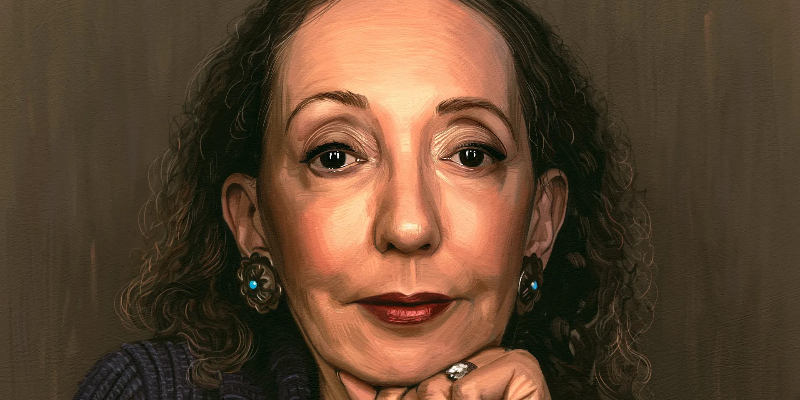Illustration by Krishna Bala Shenoi.
Talk Easy with Sam Fragoso is a weekly series of intimate conversations with artists, authors, and politicians. It’s a podcast where people sound like people. New episodes air every Sunday, distributed by Pushkin Industries.
*
This week, we revisit our conversation from last August with Joyce Carol Oates. We begin with her daily routine, from writing to revision, the real-life events that inspired her new novel, Babysitter, and why she’s fascinated with examining violence in her work. Then, we walk through Oates’ early years: growing up on a farm, her literary influences, and the lasting relationship she formed with libraries.
On the back-half, Joyce revisits a 1977 journal entry on writing, how she grapples with criticism and her complex relationship to Twitter. To close, we sit with love, loss, and why, at age eighty-four, she continues to tell new stories.
Subscribe and download the episode, wherever you get your podcasts!
From the episode:
Sam Fragoso: This new book is called Babysitter. When you finished the book last year, you took to Twitter to celebrate. You said, “Though it had seemed interminable — like the pandemic itself — a novel I’d begun last fall has been finally finished. like Chuck Close creating immense portraits through tiny mosaic-like pieces, working on a novel was a kind of therapy in a dark time.”
Joyce Carol Oates: Wow, that’s so interesting. I had forgotten I said that, but it definitely is true.
Sam Fragoso: Now that those tiny, mosaic-like pieces have come together in this finished book, what is the portrait that you see?
Joyce Carol Oates: Well, that is interesting that I said that. It did seem interminable… but of course, it didn’t really take that long. It was perhaps less than a year. Do you know how Chuck Close painted?
Sam Fragoso: I do.
Joyce Carol Oates: Because he had a neurological deficit, he wasn’t able to do certain things. So, he compensated for that by dividing a canvas up into these little parts which he could do. You know, you wake up in the morning and think— I can do that. I’m not going to be able to paint the Mona Lisa, and I don’t have the kind of agility of Picasso, but I can paint some little, pointilist thing. So, with writing, I think it might be a little like that where you break down what you’re doing into chapters, and then there are scenes and paragraphs. I think James Joyce wrote that way also.
Sam Fragoso: With this book in front of you, as you reflect on what’s in it, what is the bigger picture?
Joyce Carol Oates: It’s a novel. It’s a story set in Detroit in 1977. It’s really about interpreting reality retrospectively or in the moment. So, it’s kind of an experiment. When one is writing, one is writing in a historical present. But often what one is writing takes place in the past. So, it’s like a summarizing vision where it’s all past. I wanted to experiment with the experience of writing something in the historical present where it wasn’t that clear where it was going, so that there are alternative realities. All of those possibilities are very exciting to me. I’m sort of interested in some ideas that are philosophical—or some ideas that classical science fiction writers explore.
Sam Fragoso: What are those questions?
Joyce Carol Oates: Well, the question of, where do we actually exist mentally? When you think back on your life to an event where, at the time, you didn’t know where it was going, is your apprehension of what you were doing now on some more profound level than it was then? I have a feeling that we don’t really know what our emotions are until there’s a little phase that’s over with. Where does the reality of our emotional experience lie? Is it retrospective? Maybe when people get older, when they’re almost ready to die, William Butler Yeats spoke of “dreaming back.” He talks about the mind dreaming back over the life, and now assessing it in a way that, at the time you lived it, you were not able to do.
__________________
Joyce Carol Oates is a recipient of the National Humanities Medal, the National Book Critics Circle Ivan Sandrof Life Achievement Award, the National Book Award, and the 2019 Jerusalem Prize for Lifetime Achievement, and has been nominated several times for the Pulitzer Prize. She has written some of the most enduring fiction of our time, including the national best sellers We Were the Mulvaneys; Blonde; and the New York Times best seller The Falls, which won the 2005 Prix Femina. In 2020 she was awarded the Cino Del Duca World Prize for Literature. She is the Roger S. Berlind ’52 Distinguished Professor of the Humanities emerita at Princeton University and has been a member of the American Academy of Arts and Letters since 1978.
Sam Fragoso is the host of Talk Easy with Sam Fragoso, a weekly series of conversations with artists, activists, and politicians. His writing has appeared in The Atlantic, Vanity Fair, and NPR. After conducting seminal interviews with icons like Spike Lee, Werner Herzog, and Noam Chomsky, he independently founded Talk Easy in 2016.
